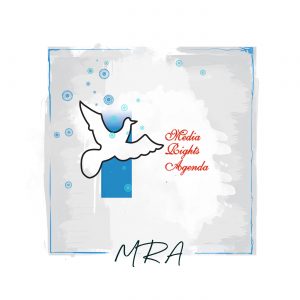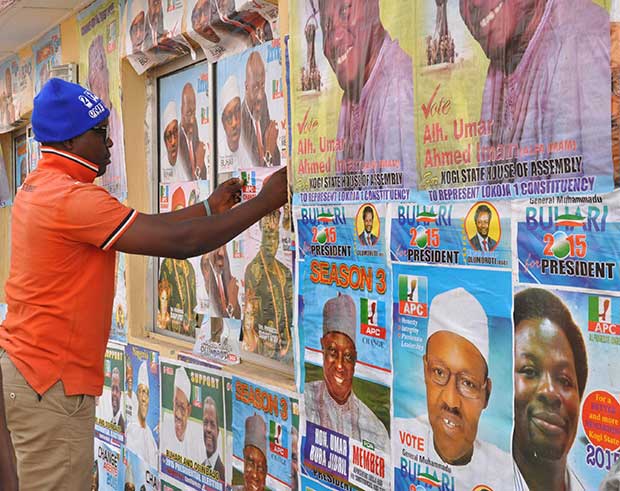13 Mar 2019 | Awards, News and features
[vc_row][vc_column][vc_video link=”https://youtu.be/2DupMR8Kao8″][vc_column_text] Media Rights Agenda (MRA) is a non-profit organisation that has spent the last two decades working to improve media freedom and freedom of expression in Nigeria by challenging the government in courts.
Media Rights Agenda (MRA) is a non-profit organisation that has spent the last two decades working to improve media freedom and freedom of expression in Nigeria by challenging the government in courts.
While the 1999 Constitution of the Federal Republic of Nigeria guarantees the right to freedom of expression, other laws – including the sections of the Criminal Code, the Cybercrimes Act and the Official Secrets Act – limit and even criminalise expression.
Through its active legal team, MRA has initiated strategic litigation targeting dozens of institutions, politicians and officials with the aim of improving the country’s legal framework around media freedom. Its persistent campaigning and lawsuits around freedom of information have helped improve access to government-held data.
A notable example is MRA’s work on Nigeria’s Freedom of Information Act. The organisation campaigned for over a decade to ensure Nigeria adopted its own FOI Act, and even wrote a draft of the bill. Although an FOI act was finally passed, many states and institutions are not complying with the new law.
So far, the organisation has found 66 institutions and two judges that still fail to comply with the act – and has named, shamed and at times sued them. It continues to have many active court cases against government officials and institutions over over the application of the act.
MRA has since also provided pro bono legal services to journalists, including FOI litigation to implement the act, and FOI training to over 2,000 journalists and organisations.
MRA also draws attention to attacks on journalists and the media through its website.
MRA and its partners are also currently challenging the repressive provisions of Nigeria’s Cybercrimes Act, and the case is currently pending at the Nigerian Supreme Court. The Section 24 of the 2015 law has been used by the country’s politicians to accuse journalists of cyberstalking for the publication of critical articles.
At the continental level, MRA was among the organisations that campaigned against internet shutdowns in Africa. The campaign resulted in a resolution by the African Commission on Human and People’s Rights affirming the rights of all Africans to free expression online.
MRA was also one of the organisations that worked to develop the African Declaration on Internet Rights and Freedoms and the African Platform on Access to Information (APAI) Declaration. [/vc_column_text][vc_separator][vc_row_inner][vc_column_inner width=”1/2″][vc_single_image image=”104691″ img_size=”full” onclick=”custom_link” link=”https://www.indexoncensorship.org/2019/01/awards-2019/”][/vc_column_inner][vc_column_inner width=”1/2″][vc_column_text]
Index on Censorship’s Freedom of Expression Awards exist to celebrate individuals or groups who have had a significant impact fighting censorship anywhere in the world.[/vc_column_text][/vc_column_inner][/vc_row_inner][vc_separator][/vc_column][/vc_row][vc_row][vc_column][vc_basic_grid post_type=”post” max_items=”4″ element_width=”6″ grid_id=”vc_gid:1552057575584-da476382-369c-6″ taxonomies=”26925″][/vc_column][/vc_row]
4 Feb 2015 | Africa, mobile, News and features, Nigeria

Walls are plastered with campaign posters ahead of the 14 Feb elections in Nigeria. (Heinrich-Böll-Stiftung/Flickr)
Update: This article was posted before Nigerian election authorities postponed the polls until March 28, 2015.
As Nigeria’s 14 February general election approaches, the menace of Boko Haram has intensified. Attacks are more frequent and brutal. No Nigerian is entirely safe.
In Baga, a community in Borno state in Nigeria’s north-east, over 2000 people were reportedly killed in a single attack in January. Boko Haram is easily one of the world’s deadliest terror groups — a group that slit 61 school boys’ throats in a raid; that straps bombs on 10 year-olds; that has kept 276 school girls abducted for almost a year and is abducting more; that has killed over 30,000 Nigerians and left over 3 million displaced.
The group now controls a land mass the size of Costa Rica, collects taxes, has its own emirs and has declared a caliphate incorporating parts of Nigeria, Niger, Chad and Cameroon. On 25 January 2014, the group, in a very daring move, made efforts to seize Maiduguri, the Borno state capital.
Boko Haram’s activities are not restricted to the north-eastern part of Nigeria as generally believed. The attacks on the UN headquarters and police headquarters in Abuja, the federal capital city, and several other deadly assaults occurred in Nigeria’s north central states.
The group’s attacks have stagnated economic growth in the north east and weakened diplomatic relations between Nigeria and neighbouring countries. In an escalation, Chadian troops have attacked Boko Haram positions in Nigeria, the BBC reported on 3 Feb.
Local views
While the group has consistently reiterated that it is out to Islamise Nigeria, a good number of Nigerians — Muslims and Christians alike — find this implausible.
Initially it was a convincing strategy because the group targeted mostly Christian places of worship and a few government institutions. Over time, however, the attacks became more random and less deliberate. Individuals of different ethnic groups and religious convictions were dragged off buses and killed in vile operations in broad daylight, typically lasting several hours with no interruption from security agencies. Entire villages have been ransacked regardless of religion or ethnicity.
Some Nigerian Christians however, opt to stick with Boko Haram’s initial script, pointing out that the group’s attacks bear a close resemblance to those of ISIS, known to have a very low tolerance for people of other faiths and liberal Muslims. A handful of northern Muslims agree with this line of thought.
There are also those who believe the group is being funded by some members of the northern Islamic political elite for selfish gain. Such theories appear to have basis in fact. At least one sitting senator and a former governor of Borno state, have been closely linked at various times to the group. Why none of them have been investigated leaves most Nigerians baffled.
There are other theories about the rise of Boko Haram that pin the blame on the government. This line of reasoning cites the president’s southern heritage for a lack of interest with the violence in the north. Southerners are seen to be taking vengeance for the loss of lives and property suffered at the hands of northerners during the Biafran War of 1967. Boko Haram also presents another route for siphoning Nigeria’s funds into private accounts.
The accusations of a self-acclaimed Australian “negotiator”, Stephen Davies, that Nigeria’s former Chief of Defence Staff, Major General Azubuike Ihejirika, a southern Christian, was actively involved in funding Boko Haram activities while working to undermine Nigeria’s army, resonated with many Nigerians of northern extraction who believe the current administration is out to cripple the region. Some southerners, on the other hand, say the northerners brought Boko Haram upon themselves and should therefore reap the fruits of their folly. Such people neither see Boko Haram as a national threat nor believe there is any truth to some of the harrowing stories coming out of the north, viewing them simply as an attempt to frustrate President Goodluck Jonathan, himself a southern Christian, out of office.
Media silence
The media in Nigeria, despite their seeming independence, are divided along political lines depending on ownership. Government media are biased in favour of the government while the private media lean towards the political loyalty of the owner. Accountability to the citizens is low.
Investigative reporting on the situation in the north by local media is limited. Local journalists are quick to point out that they lack the support of their respective organizations to report these stories. The lack of insurance, social benefits or recognition in the event of death is also cited as reasons for this reluctance. Indeed several media houses have been attacked without any response from the authorities.
Nigerians will often quote foreign press in authenticating their stories, since other local sources are generally viewed as suspect. For instance, while authorities put the deaths in Baga at 150–based primarily on guess work, foreign media reported 2,000 deaths based on satellite imagery and interviews with some who escaped the carnage.
The military appears helpless. Stories are told of soldiers who trade their arms for mufti from the locals or wear civilian clothes under their uniforms in order to enhance escape in the event of an attack. Boko Haram is considered more brutal to soldiers.
In a recent interview with CNN anonymous soldiers said that supplies and incentives are low, morale is lacking and wounded soldiers are made to pay for their treatment. A spokesperson for the military has since denied these allegations, labelling the claims “satanic”. There has been at least one incident of mutiny among the troops in the north.
Most Nigerians see BH as a threat to Nigeria’s development and would want an end to the menace. Life is now altered. Roads that were four lanes in the past are now narrowed to a lane or two in areas with a heavy government presence. The roads in the country are heavily guarded, and a general sense of unease and fear rules especially in northern Nigeria.
Will Nigerians speak to the situation in the coming presidential elections? Tough question. Ordinarily yes, Nigerians will respond by voting out a government that has shown a complete lack of determination, political will or focus to counter Boko Haram.
But this is Nigeria. The political elite have successfully used religion and ethnicity to divide the populace, wherein voting, even if it counts, will be coloured by ethnicity and religion. Even so, for the first time in the annals of Nigeria’s history, the president’s campaign convoy has been repeatedly stoned.
February 14, Valentine’s day, Nigeria’s Presidential elections day, will tell where the love truly lies.
This article was originally published on 4 February 2015 at indexoncensorship.org
 Media Rights Agenda (MRA) is a non-profit organisation that has spent the last two decades working to improve media freedom and freedom of expression in Nigeria by challenging the government in courts.
Media Rights Agenda (MRA) is a non-profit organisation that has spent the last two decades working to improve media freedom and freedom of expression in Nigeria by challenging the government in courts.
